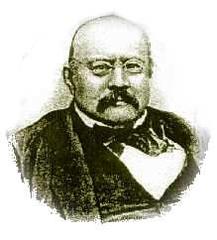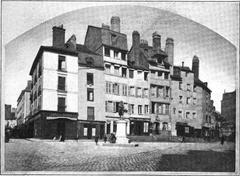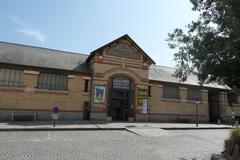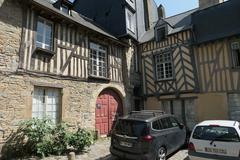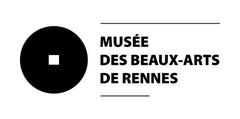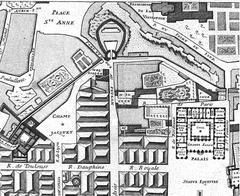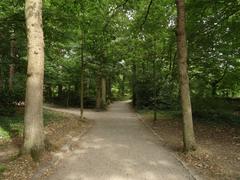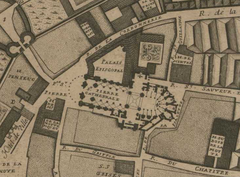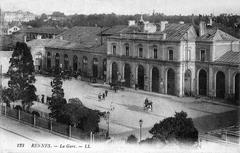
Parc du Thabor Rennes: Visiting Hours, Tickets, and Travel Guide
Date: 04/07/2025
Introduction
Nestled in the vibrant heart of Rennes, France, Parc du Thabor stands as one of the nation’s most celebrated urban parks, seamlessly blending centuries of history, exceptional botanical diversity, and a dynamic cultural calendar. Spanning approximately 10 hectares (24 acres), the park features a harmonious fusion of French formal gardens, English landscape design, and a botanical collection boasting more than 10,000 plant species. Established on monastic land in 1610, Parc du Thabor was transformed into a public space after the French Revolution, reflecting ideals of civic engagement and community well-being (Tourisme Rennes; Wikipedia).
Today, the park attracts 1.5 million visitors annually, serving as a tranquil refuge for residents and tourists alike. It is renowned for its spectacular rose garden, historic architectural features, and as a venue for major festivals such as Mythos, Les Tombées de la Nuit, and Fête de la Musique. With inclusive accessibility features, public amenities, and pet-friendly policies, Parc du Thabor is an essential destination for anyone exploring Rennes (Rennes Capitale; FranceRent).
This guide provides all essential details for your visit, including current opening hours, ticketing, travel tips, accessibility, and nearby attractions, ensuring you make the most of this iconic cultural and natural landmark (rennesurbantrail.bzh; dimanche.rennes.fr).
Quick Visitor Information
- Opening Hours:
- Spring/Summer (April–September): 7:00 AM – 9:00 PM
- Autumn/Winter (October–March): 7:30 AM – 7:00 PM
- Note: Hours may vary on holidays or for special events.
- Entry Fee: Free for all visitors.
- Accessibility: Wheelchair-accessible paths, ramps, and accessible restrooms.
- Facilities: Public restrooms, café near the orangerie, picnic spots, and bicycle parking. Limited street parking nearby.
- Pets: Dogs allowed on a leash.
Directions and Getting There
Parc du Thabor’s central location makes it easily accessible:
- On Foot: 15-minute walk from Rennes train station or city center.
- By Metro: Sainte-Anne station (5-minute walk).
- By Bus: Lines 1, 2, and 12 serve nearby stops (Rue Martenot).
- By Bicycle: Several bike-sharing stations close to the entrance.
- By Car: Limited paid parking in surrounding streets; public transport is recommended.
Historical Overview
Monastic Origins and Civic Transformation
Founded in 1610 by Benedictine monks from Saint-Melaine Abbey, the original gardens were used for orchards and vegetables, accessible only through the abbey’s cloister. The area, called “Thabor” after the biblical Mount Tabor, remained a rare green enclave within medieval Rennes’ fortified walls.
The French Revolution marked a turning point: in 1793, the city acquired the gardens and opened them to the public, converting some monastic buildings into a hospice—a symbolic shift to civic ownership and public welfare.
19th-Century Redesign
From 1866 to 1868, the acclaimed Bühler brothers, Denis and Eugène, reimagined the grounds, merging French formal layouts with English landscape features. Their work resulted in geometric flowerbeds, winding paths, and a vast botanical collection, introducing thousands of exotic plants from across the French colonial world.
Architectural Highlights
- French Formal Garden: Symmetrical beds, ornamental fountains, and clipped hedges.
- English Landscape Garden: Rolling lawns, meandering paths, and mature trees.
- Rose Garden: 2,000+ varieties, best viewed in late spring and summer.
- Orangerie & Aviary: Citrus trees and a variety of birds.
- Bandstand, Ornamental Gates, and Bishop’s Palace Remnants: Historic architectural features perfect for photography and cultural appreciation.
Unique Features & Highlights
- Rose Garden: Famed for its collection of over 2,000 rose varieties.
- Orangerie: Seasonal exhibitions and lush citrus plants.
- Monumental Staircase & Water Features: 19th-century additions ideal for photos.
- Bandstand: Venue for concerts and performances.
- Botanical Garden: Over 3,000 species, including rare and protected plants.
Tips for Visitors
- For peak blooms, visit in late spring or early summer.
- Early mornings or weekdays offer a quieter experience.
- Check the official tourism portal for event schedules and guided tours.
- Bring a camera to capture the rose garden, water features, and historic monuments.
Civic Role and Community Engagement
Parc du Thabor is a living symbol of Rennes’ commitment to civic well-being, environmental stewardship, and cultural enrichment. As a “Jardin de prestige de type 1,” it is meticulously maintained and hosts diverse community activities, from open-air concerts and public festivals to educational workshops (Tourisme Rennes; Wikipedia).
Social Inclusion and Accessibility
The park is designed for everyone:
- Barrier-Free Access: Wheelchair-friendly paths and restrooms.
- Family Amenities: Playgrounds and a carousel.
- Pet Policy: Dogs permitted on a leash.
Educational and Environmental Impact
Parc du Thabor’s botanical collections act as an open-air classroom, with interpretive signage and guided tours available (Tourisme Rennes). The park’s grainothèque preserves over 2,000 taxa and supports global seed exchanges, underscoring its ecological value.
Cultural Programming and Festivals
- Transat en Ville: Summer open-air concerts.
- Les Tombées de la Nuit: July festival with innovative performances (Tourisme Rennes).
- I’m From Rennes: Music festival in September.
- Le Grand Soufflet: October’s world music and accordion celebration.
- Mythos: Spring festival of storytelling and music.
- Fête de la Musique: June 21 national music day.
- Les Mercredis du Thabor: Breton music, dance, and regional cuisine every Wednesday in July (Les Plus Belles Fêtes de France).
- Odyssée Lumineuse: Lantern festival illuminating the gardens in winter (JDS).
Nearby Attractions
- Notre-Dame-en-Saint-Melaine Church: Adjacent to the park.
- Musée des Beaux-Arts de Rennes: Art museum within walking distance.
- Rennes Historic Center: Explore shops, cafés, and more.
Seasonal Highlights and Annual Events
- Spring: Tulips, daffodils, and blossoming magnolias create vibrant displays (try-travel.com).
- Summer: Rose garden at its peak; ideal for picnics and outdoor relaxation (triphobo.com).
- Autumn: Brilliant foliage transforms the landscape (rennesurbantrail.bzh).
- Winter: Formal gardens and sculptures stand in serene contrast; visit the greenhouses for exotic plants (triphobo.com).
Annual Special Events
- La Journée des Arts: May 18, 2025 – Outdoor painting competition for all ages (dimanche.rennes.fr).
- BEAST Binic Summer Fest: July 30, 2025 – A ticketed music and arts festival (allevents.in).
Frequently Asked Questions (FAQ)
Q: What are Parc du Thabor’s visiting hours?
A: 7:00 AM to 9:00 PM (April–September); 7:30 AM to 7:00 PM (October–March).
Q: Is there an entry fee?
A: Admission is free.
Q: Are pets allowed?
A: Yes, dogs on a leash.
Q: Is the park accessible for people with reduced mobility?
A: Yes, with accessible paths and restrooms.
Q: Are guided tours available?
A: Yes, via the Rennes Tourist Office.
Visual Resources
- Panoramic view of the rose garden in bloom (alt=“Parc du Thabor rose garden in Rennes”)
- Photo of the monumental staircase and waterfall (alt=“Monumental staircase and waterfall at Parc du Thabor”)
- Map showing Parc du Thabor’s location in Rennes (alt=“Map of Parc du Thabor and Rennes city center”)
Summary and Recommendations
Parc du Thabor is a living testament to Rennes’ historical evolution, ecological stewardship, and cultural vibrancy. With its meticulously maintained gardens, diverse botanical collections, and architectural gems, the park offers a serene yet engaging environment year-round. Its civic role as a gathering space and center for public events fosters a sense of community and social inclusion (Tourisme Rennes; FranceRent).
With free entry, excellent accessibility, and a full calendar of cultural programming, Parc du Thabor is a highlight for any visit to Rennes. Enhance your experience with guided tours or by attending annual festivals, and always check the official tourism portal for the latest updates.
Plan Your Visit
For up-to-date details on events, accessibility, and more, consult these resources:
- Official Rennes Tourism portal
- Rennes Capitale
- Rennes Urban Trail
- La Journée des Arts 2025
- Parc du Thabor Wikipedia
- FranceRent
For event tickets and additional details, check official event pages and city calendars.


